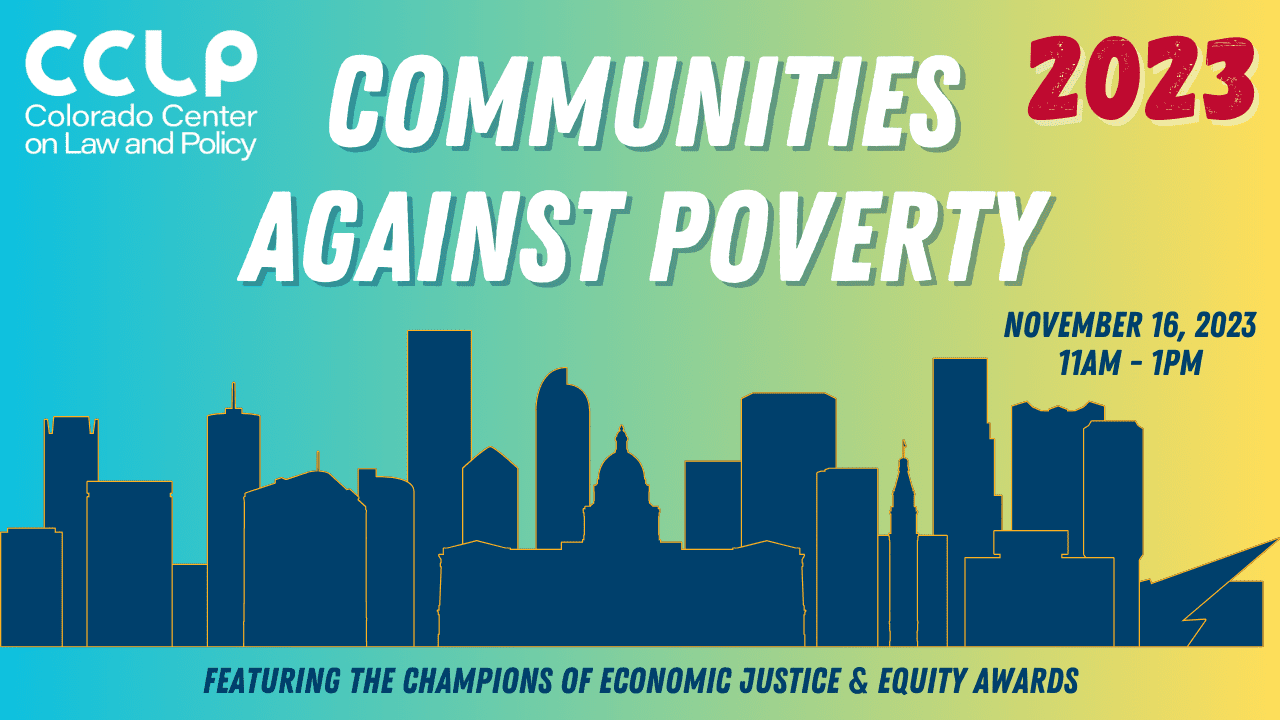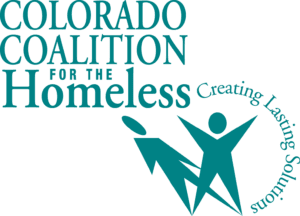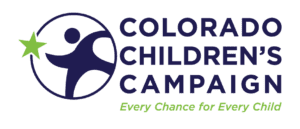Communities Against Poverty is back and in-person, November 16, 2023 from 11am to 1pm at the History Colorado Center!
We’re proud to announce that our keynote speaker this year will be Jeremie Greer, Co-Founder and Co-Executive Director of Liberation in a Generation who has dedicated his life and career to the advancement of racial and economic justice. We will also once again present this year’s Champion of Economic Justice & Equity Awards to the stand-out community organizers, partner organizations, legislators, and individuals who made a difference in the lives of Coloradans over the past year.
Lunch will be provided throughout the event.
This event is a price ticketed event. If cost is a barrier but you would still like to attend, please contact Bruce Barnum, by phone at (303) 573-5669, ext. 312, or by email at bbarnum@CCLPonline.org.
Sponsors for Communities Against Poverty 2023
Supporting Sponsors
Keynote Speaker by Jeremie Greer
Author, Scholar, Activist

Jeremie Greer is the Co-Founder and Co-Executive Director of Liberation in a Generation who has dedicated his life and career to the advancement of racial and economic justice. He began his career in the Columbia Heights and Shaw neighborhoods in Washington, DC, organizing youth and tenants to fight back against the economic forces rapidly gentrifying that community. Working at the national level in the federal government’s premier policy agency, the Government Accountability Office (GAO), and at two national non-profits, the Local Initiative Support Corporation (LISC) and Prosperity Now (formerly CFED), he has become a national policy expert on the causes and the policy solutions to close racial wealth gap. Jeremie has a Master’s in Public Policy from George Mason University and a Bachelor’s Degree in Social Work from the University of St. Thomas. Some of his work includes: The Black Boy Has Regained His Ability to Dream, Can the economy be liberated?, and Remaking the Economy: Closing the Racial Wealth Gap.
Champions of Economic Justice and Equity Awards
2023 Legislator of the Year
Representative Andrew Boesenecker
Representative Andrew Boesenecker is this year’s Legislator of the Year!
Representative Andrew Boesenecker (D) began serving as State Representative for House District 53 in Larimer County in April 2021. He serves on the House Appropriations; the Transportation, Housing and Local Government; Legislative Audit; and the State, Civic, Military and Veterans Affairs Committees and as Majority Co-Whip.
Born in Holland, MI, Rep Boesenecker was raised in a family that included public school employees, teachers, veterans, and law enforcement officers. He received a Bachelor of Music in Percussion Performance from Western Michigan University in 2001. After serving as a music teacher, independent musician, stay-at-home dad, and church musician, he moved from Atlanta to Fort Collins in 2009 with his spouse Stacey. His passion for justice and equity, coupled with his love of grass roots community organizing, led him to complete a master’s in divinity from Iliff School of Theology in 2013. He then became an ordained minister of the Evangelical Lutheran Church. He worked to launch open and affirming communities of faith in Fort Collins, Greeley, and Loveland. He also served on the Larimer County Interagency Oversight Group board.
Working in partnership with communities affected and other stakeholders, Representative Boesenecker was sponsor of several key bills CCLP supported during his two full years in the House:
House Bill 22-1287 – Protect Mobile Home Park Residents
Senate Bill 22-160 – Loan Fund for Resident Purchase of Mobile Home Parks
House Bill 23-1190 – Affordable Housing Right of First Refusal (vetoed by the Governor)
House Bill 23-1257 – Mobile Home Park Water Quality
House Bill 23-1215 – Limits on Hospital Facility Fees
He believes it is important for elected officials to listen to community members, build consensus and trust while leading on issues that are most important to his community.
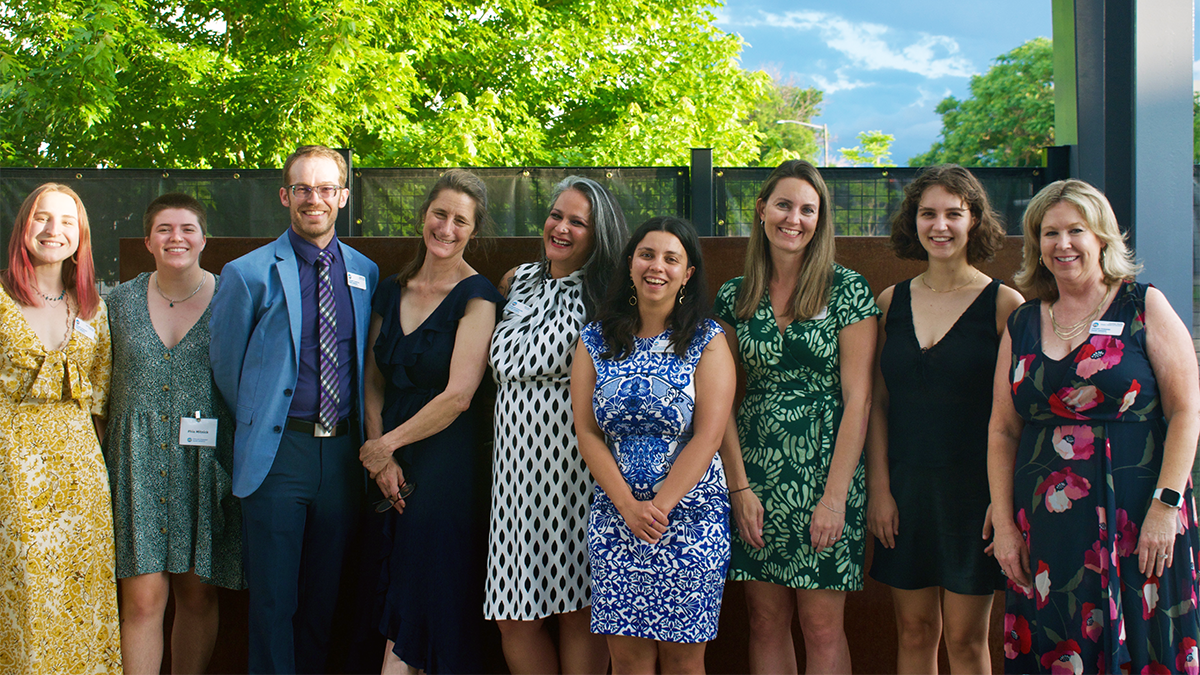
2023 Community Partner Organization of the Year
Colorado Consumer Health Initiative
Colorado Consumer Health Initiative is this year’s Community Partner Organization of the Year!
Colorado Consumer Health Initiative (CCHI) is a statewide, non-partisan, non-profit membership organization working so all Coloradans can receive affordable, high-quality and equitable health care. CCHI’s membership consists of over 30 nonprofit organizations, plus an increasing number of individual members to shape effective health care policy. CCHI was created in 2000 to be a counterweight to powerful health care interests by building a cohesive consumer voice among health advocacy organizations and their constituents.
CCHI has three programs: Policy Advocacy, Strategic Engagement and Consumer Assistance. The Policy Advocacy and Strategic Engagement programs conduct research, analysis, and advocacy at the legislative and regulatory levels to promote access, affordability, equity and quality of health care. The Strategic Engagement program engages consumers to understand and share their experiences in health care, deploys strategic messaging, and engages the public to build awareness and public will on CCHI issues through outreach, digital and traditional media.
Through these efforts, CCHI has been pivotal in passing major health care reform legislation driven by community and consumer needs, including protections against surprise billing, establishing a Prescription Drug Affordability Board (PDAB) to tackle the high cost of prescription drugs, advancing health equity and lowering insurance costs through the Colorado Option, and more!
The Consumer Assistance program provides direct assistance to individuals who are facing barriers accessing or paying for health care. Since 2018, CAP has served over 3,000 Coloradans and saved clients over $7 million. The three programs work together to identify problems with the health care system, highlight opportunities for policy change, and provide an opportunity for consumer and community engagement in building public and political will for change.
2023 Community Advocates of the Year
Misty Alire, Kayce Atencio, and Lindsey Vance
Medical Debt Community Advocates
Medical Debt Community Advocates: Misty Alire, Kayce Atencio, and Lindsey Vance are this year’s Community Advocates of the Year!
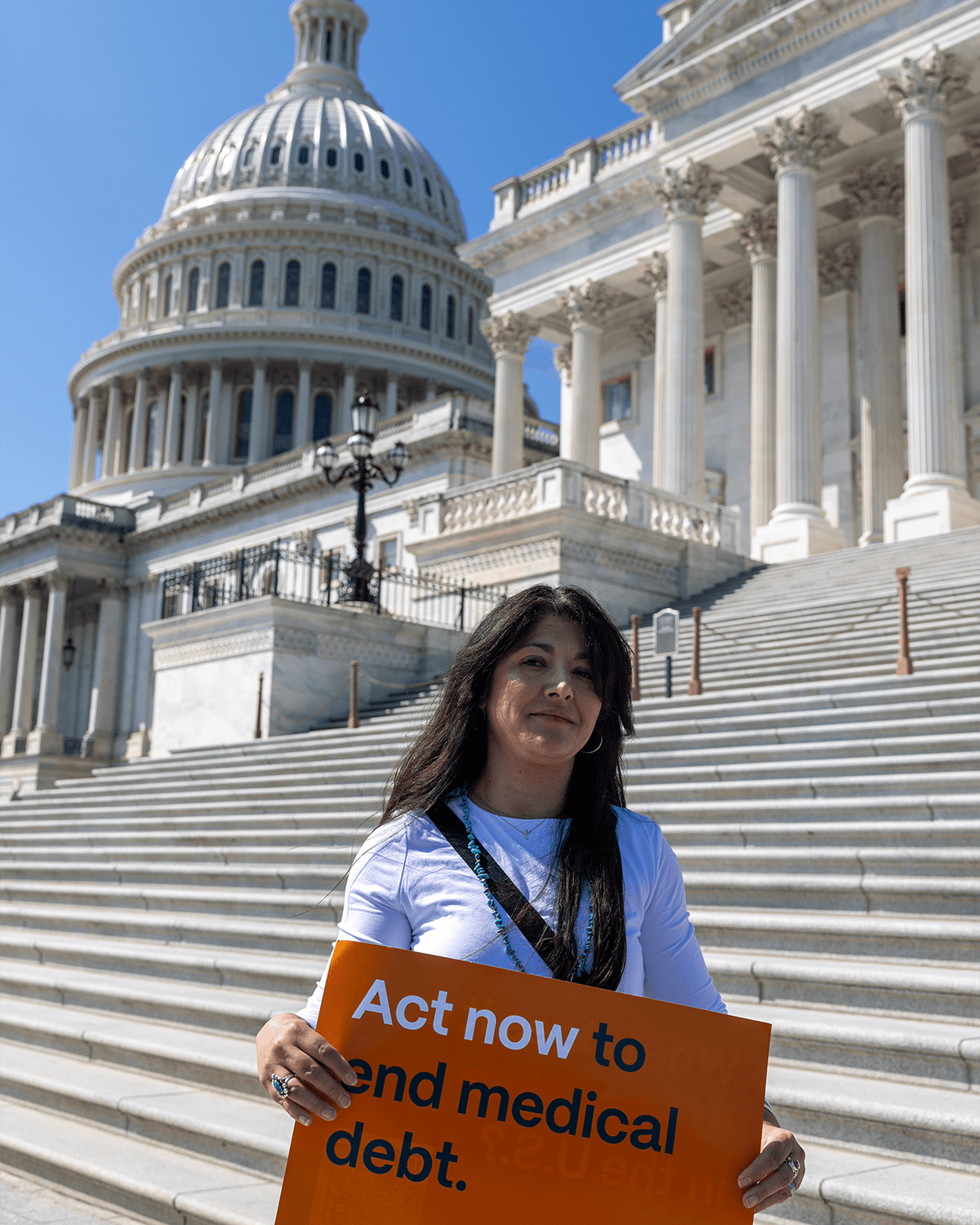
Medical Debt Advocate, Misty Alire
Misty Alire, a single mother of two, is a congenital heart defect survivor. At 23, Misty underwent life-saving heart surgery that left her with $200,000 in medical bills. At the time, she was married to an abusive partner and wanted a divorce, but because her medical debt had destroyed her credit score, Misty couldn’t get housing, a car, or a credit card without her husband. Forced by crushing medical debt into financial dependency, Misty struggled to escape her abuser for many years.
Medical debt even made it difficult for Misty to get a job and get back on her feet. Misty studied and got her license to be an insurance provider, but could not get a job because prospective employers checked her credit as part of the hiring process.
Along with our other two medical debt advocates, Misty shared her incredibly powerful experience to legislators in Colorado in advocating for the removal of medical debt on credit reports in Colorado. Her story led her to speak in Washington D.C., along with other state advocates, at Community Catalyst’s Medical Debt Day of Action. Her story was also recounted in an AP article in April 2023.
Medical Debt Advocate, Kayce Atencio
Kayce Atencio is a full time student at MSU-Denver, working towards a master’s in social work to become a licensed clinical social worker. At the age of 19, Kayce underwent heart surgery for a congenital condition, a procedure which left him deeply in debt and struggling to survive for years.
This year, Kayce stood up to tell his deeply personal story to legislators and to reporters alike, courageously advocating in favor of the medical debt credit reporting bill which passed into law. His story has been shared by NPR, KFF Health News, and by Colorado Politics.
Kayce’s passions include harm reduction, disability advocacy and trans advocacy. As a disabled trans man, he seeks to use his story to create lasting change, and plans to continue to engage in macro social work through policy and legislation when he graduates in 2026.

Medical Debt Advocate, Lindsey Vance
Lindsey Vance is a community health worker serving Denver’s most underserved populations. She has lived in Denver for the last 5 years with her husband and 3-year-old daughter.
Lindsey bravely testified to Colorado state legislators about her experience incurring medical debt as a young person, when she didn’t have good health insurance — a debt which continues to cause significant burdens to her today. Her testimony, along with our other two medical debt advocates, helped remove medical debt from credit reports in Colorado. Lindsey’s story was referenced in both an NPR piece and an AP article.

2023 Government Partner of the Year
Christina Postolowski
Christina Postolowski is this year’s Government Partner of the Year!
Christina Postolowski was hired by the Department of Local Affairs (DOLA), Division of Housing (DOH) in October 2019 to serve as the first Program Manager for the Mobile Home Park Oversight Program (MHPOP). The Colorado General Assembly created MHPOP in 2019 in response to a Sunrise Review, which found that harm was occurring in some mobile home parks due to a lack of awareness and enforcement of existing laws.
Prior to joining DOLA, Ms. Postolowski worked for Young Invincibles (YI), a national nonprofit dedicated to engaging young adults on public policy issues, in Washington D.C. In 2015, Ms. Postolowski returned to her home state of Colorado to open the organization’s Denver office and serve as YI’s Colorado Director. Ms. Postolowski holds a Bachelor of Arts from Princeton University and a Juris Doctor (J.D.) from Georgetown Law. She lives with her husband, Daniel, and five-year-old daughter in Morrison.
In her current role with MHPOP, Ms. Postolowski has worked closely with her staff, stakeholder groups like the Colorado Center on Law and Policy (CCLP), local government officials, and MHP residents and landlords to create and implement the new state oversight program. With support from DOH leadership, Ms. Postolowski pushed to increase staffing for the program. She has presented at public meetings and led rounds of rulemaking to clarify the act and strengthen the oversight program. Ms. Postolowski works hard to ensure that the program has the tools and resources it needs to serve the people of Colorado.
Premios Campeones de la Justicia y Equidad Económica

2023 Legislador del Año
Representante Andrew Boesenecker
El Representante Andrew Boesenecker es el Legislador del Año de este año!
Representante Andrew Boesenecker (D) empezó actuar como un representante del estado para el Distrito de la Cámara 53 en el Condado de Larimer el abril de 2021. Él actúa como Co-Whip de la mayoría y en los comités de asignaciones, transporte, el alojamiento y el gobierno local, auditoria legislativa, y el estado, civil, asuntos de militares y veteranos.
Nacido en Holland, Michigan, el Representante Boesenecker se crio en una familia que incluía empleados de escuelas públicas, maestros, veteranos y oficiales de policía. Obtuvo una licenciatura en interpretación de percusión de la Universidad Western Michigan en 2001. Después de trabajar como profesor de música, músico independiente, padre que se quedaba en casa y músico de iglesia, se mudó de Atlanta a Fort Collins en 2009 con su esposa Stacey. Su pasión por la justicia y la equidad, junto con su amor por la organización comunitaria de base, lo llevó a completar una maestría en divinidad de la Escuela de Teología Iliff en 2013. Luego se ordenó como ministro de la Iglesia Luterana Evangélica. Trabajó para lanzar comunidades de fe abiertas y afirmativas en Fort Collins, Greeley y Loveland. También se desempeñó en la junta del Grupo de Supervisión Interinstitucional del Condado de Larimer.
Trabajando en colaboración con comunidades afectadas y otros interesados, el Represante Boesenecker patrocinó muchos proyectos de ley importante por CCLP durante sus dos años en la Cámara:
House Bill 22-1287 – Protect Mobile Home Park Residents
Senate Bill 22-160 – Loan Fund for Resident Purchase of Mobile Home Parks
House Bill 23-1190 – Affordable Housing Right of First Refusal (Vetado por el gobernador)
House Bill 23-1257 – Mobile Home Park Water Quality
House Bill 23-1215 – Limits on Hospital Facility Fees
Él cree que es importante que los funcionarios elegidos escuchen a los miembros de la comunidad, forjar consenso, y generar confianza mientras dirigir en los asuntos más importantes en su comunidad.

Organización Comunitaria del Año 2023
Colorado Consumer Health Initiative
¡Colorado Consumer Health Initiative es la Organización Comunitaria del Año de este año!
Colorado Consumer Health Initiative (CCHI) es una organización estatal, no partidista y sin fines de lucro, trabajando para que todos en colorado puedan recibir la atención médica asequible, de alta calidad, y equitativa. Los socios de CCHI constan de más de 30 organizaciones sin fines de lucro, además un creciente número de socios individuales para formar políticas de la atención médica que son efectivas.
CCHI tiene tres programas: La abogacía de políticas, la participación estratégica, y la ayuda de los consumidores. Los programas de la abogacía política y participación estratégica realizan investigaciones, análisis, y abogacía a los niveles legislativos y regulatoria para promover el acceso, la asequibilidad, la equidad, y la calidad de la atención médica. El programa de la participación estratégica les involucra los consumidores para entender y compartir sus experiencias con la atención médica, implementa los mensajes estratégicos, le involucra el público para crear conciencia y voluntad publica en los asuntos de CCHI por la divulgación, los medios de comunicación digital y tradicional.
¡A través de aquellos esfuerzos, CCHI ha sido crucial en aprobar importante reformas legislativas de la atención médica avanzada por la comunidad y las necesidades de los consumidores, incluyendo las protecciones contra la facturación no expectantes y estableciendo “Prescription Drug Affordability Board – PDAB” para enfrentar el alto costo de los medicamentos con receta, avanzando la equidad de salud y bajando el costo del seguro a través del Colorado Opción y más!
El programa de la ayuda de los consumidores provee asistencia directamente a los individuales que enfrentan barriadas en el acceso o el pago para la atención médica. Desde el 2018, CAP ha servido más de 3.000 personas de Colorado y ahorrado sus clientes más de $7 millones. Los tres programas funcionan juntos para identificar los problemas en el sistema de la atención médica, resaltar oportunidades por el cambio de políticas, y proveen una oportunidad por los consumidores y la involucración de la comunidad en crear consciencia y voluntad publica por el cambio.
SOCIO GUBERNAMENTAL DEL AÑO 2023
¡Muy pronto!
DEFENSORES COMUNITARIOS DEL AÑO 2023
¡Muy pronto!


